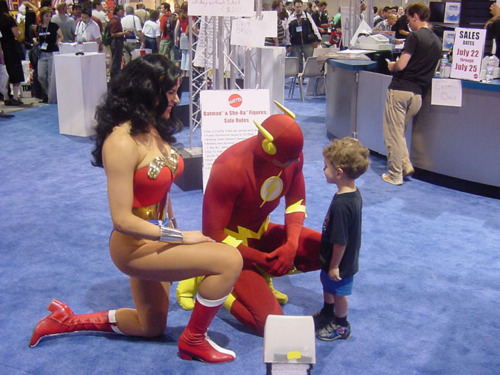
Being a fan is a curious thing. It can bring people together, it can tear them apart. It can make someone shout, laugh and jump for joy, or it can be depressing, make them scream, cry tears of sorrow or rage. A fan does not merely like something or enjoy something, they make that something a part of who they are, a part of their personality, of their identity. Being a fan takes on all sorts of shapes and sizes and people become fans for a number of different reasons, almost always reasons that are very personal to them, reasons that can be hard to explain to someone who may not be a fan as well.
Being a fan of something is not a one-size-fits-all proposition. Not all fans are created equal. People naturally experience things in different ways in all aspects of life, not only in being fans. Just as not all people are fans of the same thing, people who are fans may not be fans for the same reasons, or may not enjoy things the same way, or may have become fans at different stages of life, the list goes on. Someone may be a more critical, while another person is more accepting; one might be tightly wound, another may be more laid back. The size of a given fan group does not matter; no two fans will ever be exactly alike, no matter how big or small the fandom as a whole.
Because of that diversity within the fandom itself, conflict almost inevitably arises. Two fans clashing over one element or another of their object of adoration are a fearsome spectacle to behold. It can be regarding any one thing or any number of things, the smallest molehill or the largest gorilla in the room, and wars of words can sometimes be civil, but they can also be vitriolic, often even more so than if they were involving someone outside of the fandom itself. Fans often consider themselves experts, of a sort, and an expert does not like to have their opinions and facts challenged, especially by another expert.
Fans have a rather poor reputation in many places. The term fan comes from the word “fanatic”, and fanatic by definition means a person with an extreme and uncritical enthusiasm or zeal. It is the mindset that so wholeheartedly loves something that says anything with the appropriate branding on it will be great. It is the mindset dictating that any attempt to suggest something is not great is met with vehement and sometimes aggressive resistance. And if it truly is  not great, then that mindset decrees that the cries that it should be are loud and shrill. It is that sort of mindset and stereotype that gives fans in general a bad reputation among those outside of any given fandom.
not great, then that mindset decrees that the cries that it should be are loud and shrill. It is that sort of mindset and stereotype that gives fans in general a bad reputation among those outside of any given fandom.
The common call from witnesses with an outside view of those sorts of fans is to not take things so seriously, to not care as much. Fans do not own a given franchise or intellectual property, after all, there is nothing to gain by moaning about things at a water cooler or on an internet message board. Making one’s feelings known to a fellow fan will earn a sympathy hug at most, or being mocked for one’s ideas at worst, but without a zeitgeist of fans united under one banner, individual voices are lost amidst the noise. Apart from that sort of unified opinion, the thoughts and feelings of an individual seem worth less than spitting into the rain.
With rare exceptions, the fans do not own the rights to the things they are a fan of, that is true. But fans do own something even more important, if possible, the very things that make them fans: the emotions, memories, traditions and stories they have stored away. A Christmas morning with that present, a day spent at that event, a late night spent watching that movie, hours of playtime with that toy. Every fan has moments like these (and others, of course), that is part of what makes a fan a fan, instead of someone who just jumps on the bandwagon then leaves the moment something changes. A fan sticks with it, holding on to those memories, to those stories. A fan perseveres.
Say a new movie comes out from a franchise or property that a person enjoyed when they were younger. They see the movie and they enjoy it, not as much as the classic material, but they still enjoy it. What happens when that movie is slammed by film critics and winds up disappointing at the overall box office? Does that fan disown the movie, despite having enjoyed it, burying those feelings somewhere deep down? Do they adamantly insist that it was a great movie that others outside of the fandom just don’t get? Or do they admit that, while the film may have had flaws, they still enjoyed it, perhaps out of nostalgia and the thrill of seeing their beloved childhood icons on the big screen?
Whatever the case, a fan should not be ashamed of enjoying something for whatever reason they happen to enjoy it. If said fan instead hated the movie for what they perceive as a lack of respect for the original material, the material they grew up with and still love, they should not be mocked for that, either. A fan is entitled to their opinion, be it yea or nay; there is no universal answer or single acceptable view on whatever may come their way. Someone else may love the new movie more than the old material, an idea that might irritate other fans but does not make them any less of a fan, it just makes them different.

Or, to take another example and step out of the “geek” circle a bit, say there is a person invested in their local major-league sports team. Said team has not had much success in recent years, perhaps because of weak or ineffective coaching, perhaps because of tight-fisted, overly-involved owners, perhaps because of a lack of player talent or commitment. Whatever the case, the team has not had a winning season in some time, and the fandom as a whole is being broken up over their lack of success, throwing blame against every wall and looking to the glory days, years past, when the team had a winning record and the trophies and respect to show for it.
Maybe a fan blames the owner. Maybe they blame the coach, or the players. Maybe they do not blame anyone, and are simply devoted to their team, through thick and thin, praying that they do whatever it takes to make this the year for them to climb out of mediocrity and back into the spotlight. Sports fans know that success is not built in one year, but one year can be all it takes to turn underachievers into champions. Whatever the case, a fan who loves their team enough to want to see them succeed and not simply bail when the going gets tough is a fan who will stick around until the winner’s trophy returns to town.
Just as a fan should not be ashamed of or ridiculed for their feelings, fans should not shun or ridicule someone who feels differently than they do about an element of their shared interest. If two people who are fans of the same TV series are driven apart when one mocks the other for their love of a certain character, it harms the fandom as a whole, both in image and integrity. It might even drive the mocked fan out of the fandom entirely, embittered by their experiences, their memories forever tainted by association. That is not to say debate and discussion should never take place, far from it. Fans are inherently diverse, as stated previously. Disagreements will happen, it is an inevitable fact. It is how those disagreements are conducted that makes the difference.
Even more important is a fan’s conduct when interacting with those outside the fandom, or who represent a different fandom. The fans of two rival sports teams might be grudgingly respectful of each other’s talented players, or they may resort to physical violence to prove whose team is superior. A comic reader may admit that some artists and writers on a rival company’s book are good at what they do, or they may disregard anything they produce as trash and hackwork. How do these interactions look to those outside of both fandoms, to the casual observer? A fan should seek to be an ambassador, to show the greatness of their chosen object of veneration, to bring others into the fold. An insulated fandom is a fandom that will inevitably stagnate and turn toxic.
 It is a common reaction to lash out against any challenges from within or without against a fan’s beliefs or feelings. It is a part of being a fanatic, being devoted to something. When a threat, real or imagined, is alleged, fans rush to the defense, forming their bulwarks and drawing lines in the sand, prepared to defend their love. And it is that same reaction that causes those outside the fandom to treat those within with indifference or disdain, or perhaps to make cruel jokes at the fans’ expense for hope of provoking them. The whole situation becomes a vicious circle, one group always on the offense, the other on the defense. Someone has to step out of the circle and change things.
It is a common reaction to lash out against any challenges from within or without against a fan’s beliefs or feelings. It is a part of being a fanatic, being devoted to something. When a threat, real or imagined, is alleged, fans rush to the defense, forming their bulwarks and drawing lines in the sand, prepared to defend their love. And it is that same reaction that causes those outside the fandom to treat those within with indifference or disdain, or perhaps to make cruel jokes at the fans’ expense for hope of provoking them. The whole situation becomes a vicious circle, one group always on the offense, the other on the defense. Someone has to step out of the circle and change things.
Perhaps it is a bit too pat and general to say that most fans could stand to not take their defensive efforts quite so seriously. However, having a thin skin and jumping on every possible offense only makes everyone involved frustrated and angry. No one wins in an argument like that, regardless if it is an argument between rival fandoms, fans within the same fandom, or a fan and an outsider. What if fans turn to a more accepting and genial code of conduct? Fans should welcome new views and ideas about the things they enjoy, it might open an avenue of thinking they never would have thought of otherwise. It keeps a fandom from becoming stale, with the same ideas bandied about in circles and never progressing or growing.
At the same time, though, those outside of a fandom should find better entertainment for themselves than mocking someone for something they enjoy. Why shouldn’t someone like that show, that movie, that book, that team, that musician? Does their choice personally offend somehow, or are the mockers merely concerned with getting a rise out of someone? Even if someone does genuinely disagree with their feelings, what is served through bringing it up? What do they have to gain, a sense of accomplishment or self-righteousness? People should be better than that. Perhaps there is something within that fandom, that object of love being ridiculed, that the mocker would enjoy just as much as the fans. Perhaps they become a fan themselves. Or perhaps they shrug their shoulders and move on. Whatever the case, antagonism is never a constructive form of expression.
Liking something enough to be considered a fan of it is no great flaw. Fans are some of the most adoring and expressive people on the planet. It is also a testament to those behind the creation, support and continuing emergence of properties, persons or whatever else that they are able to inspire such creativity and passion. Fans of all kinds scream and sing and cry and laugh and grind their teeth and clap their hands together for reasons that some understand and some simply do not. But it is those same cosmopolitan differences that make fandom such a beautiful thing as a whole, something that can unite people from all walks of life under one label, one icon, one banner. Fans are a curious thing, but they are also a beautiful thing.
